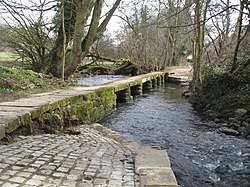River Amber
| River Amber | |
|---|---|
 Amber at Clapper Bridge in Ashover | |
| Location | |
| Country | England |
| Counties | Derbyshire |
| Physical characteristics | |
| Source | Ashover |
| Mouth | Confluence with the Derwent |
• coordinates | 53°03′36″N 1°29′02″W / 53.06000°N 1.48389°W |
| Length | 21 km (13 mi) |
| Basin size | 140 km2 (54 sq mi) |
| Discharge | |
| • location | Wingfield Park [1] |
| • average | 1.37 m3/s (48 cu ft/s) |
| Basin features | |
| Tributaries | |
| • left | Press Brook, Alfreton Brook, Buckland-Hollow Brook |
| Progression : Amber—Derwent—Trent—Humber—North Sea | |
The River Amber is a left bank tributary of the River Derwent in Derbyshire, England. It gives its name to the local government district and borough of Amber Valley.[2][3]
The name Amber is a pre-Celtic word with uncertain meaning.[4]
Course[edit]
Its source is close to the village of Ashover, near Clay Cross, and it flows southwards through Ogston Reservoir to Pentrich then turns westwards through Wingfield Park to join the River Derwent at Ambergate.[5]
Like many such rivers flowing from the Derbyshire moors, it powered a number of water mills, many of them for crushing locally mined and quarried minerals, such as limestone.
The river valley also provided a route for the Cromford Canal, at the southern end as far as Butterley Tunnel, and the North Midland Railway, to travel northwards until it passed under Clay Cross via the Clay Cross Tunnel, where it entered the valley of the River Rother and then north to Chesterfield.
References[edit]
- ^ "28048 - Amber at Wingfield Park". The National River Flow Archive. Centre for Ecology & Hydrology. Retrieved 2 October 2013.
- ^ Amber Valley Borough Council website
- ^ English Place-Name Society (1996). Journal. The Society. Retrieved 22 August 2015.
the River Amber, Derbyshire (first attested as Ambra Hy 2, Ambre late 12th), is related to the Continental rivers Amper (Ambre Antonine Itinerary), Emmer (Ambra 9th) and Ammergau (Amber go 9th).
- ^ David Mills (20 October 2011). A Dictionary of British Place-Names. OUP Oxford. pp. 12–. ISBN 978-0-19-960908-6.
- ^ Ordnance Survey (2003). Buxton & Matlock. OS Landranger Map Series. Ordnance Survey. ISBN 9780319228463.

